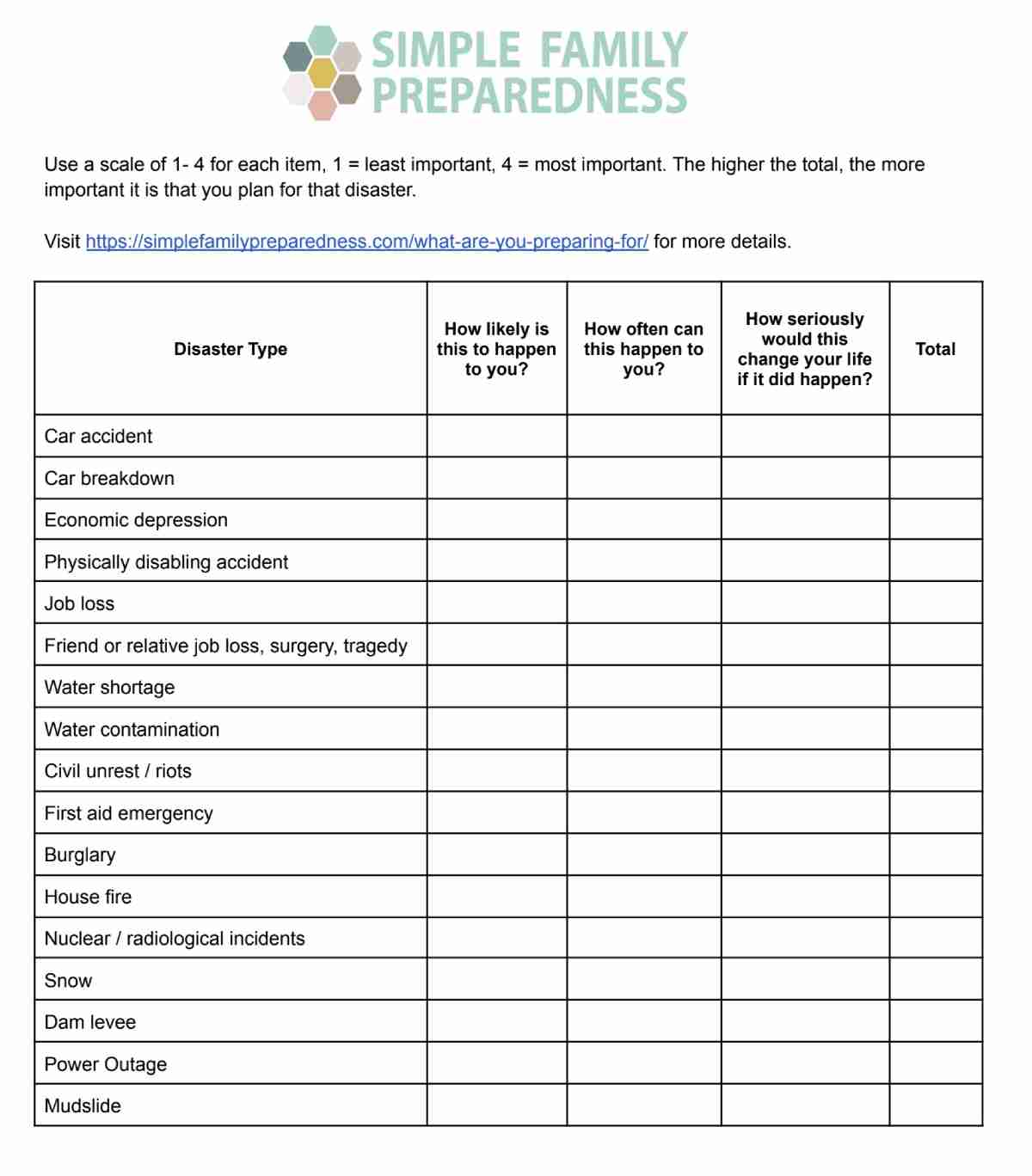What is your emergency preparedness “end game?”
Seriously! Do you know?
When you go on a trip, you typically have a destination. You are driving to a national park or Disney Land or flying to visit your sister, right?
If you didn’t know where you were going, you’d have a hard time getting there.
Emergency preparedness is similar, you need to plan your way for the end game. You need to have a goal and a plan to get there.
What are you preparing for exactly?
Are you trying to prepare for everything and anything?
That sounds stressful! Please don’t do that to yourself!
The truth is, it is very, very unlikely that you will face every single possible disaster in your lifetime. Trying to prepare for them all at once is a waste of time and energy.
Instead, give some serious thought to what you and your family should be prepared for.
This is step #1 in creating your family’s personal preparedness plan.
I’m going to give you three simple, helpful steps you can take today that will bake all your “prepping” efforts a bit more effective and focused.
A warning…
Before I start, I want to offer a word of caution.
This blog has never been, and never will be fear focused!
What I am about to suggest may cause you some anxiety as you think of all the possible scenarios you could ever face.
Please don’t let it.
While it is a certainty that not everything will go perfectly right in your life and you will have to deal with some hiccups, it is also a certainty that not everything will go terribly wrong. You will not have to deal with / face every possible disaster!
Please let this exercise decrease your anxiety by knowing that you are preparing for the most important things first!
Alright, let’s get going!
Step 1: Make A List
Sounds simple enough, right? It is, and it should only take a few minutes!
You can do this alone, or have a family brainstorming session with a spouse and / or older kids.
Simply make a list of everything that could go wrong in your life. This is the part that may make you anxious, but don’t let it!
All of these things will not happen to you.
List anything and everything from small everyday emergencies to large scale disasters.
Here are a few ideas:
- Car accident
- Car breakdown (possibly out of cell range or nearby towns)
- Economic depression
- Physically disabling accident
- Job loss
- A neighbor / friend’s job loss / surgery / tragedy
- Water shortage
- Water contamination
- Civil unrest / riots
- First aid emergency (broken bone, choking etc)
- Burglary (car or home)
- House fire
- Nuclear / radiological incidents
- Snow
- Dam / levee failure
- Power outage
- Mudslide
- Viral outbreak (pandemic)
- Wild fire
- Earthquake
- Tornado
- Tsunami
- Hurricane
- Flooding
- Volcano eruption
You can likely think of more – large and small.
Write them all down and don’t forget to breathe calmly and not freak out. There is no way all of these things will happen to you!
For example, I have not even heard of a volcano eruption in Utah, so that can come off my list.
Focus on the items that are most relevant to your area. Even city dwellers may have different issues than us country folk.
Step 2: Rate Each Disaster
Now, take a few minutes and rate each disaster on a scale of 1-4 in the following three areas:
Likelihood: How likely is this to happen to you?
1 = This will likely never happen to me / in my area
2 = This may happen to me / in my area
3 = This will likely happen to me / in my area
4 =This is very likely…almost guaranteed to happen to me / in my area
Frequency: How often could this happen to you?
1 = If this did happen, it would likely only happen once
2 = This could occur a few times in my lifetime
3 = This could occur as often as yearly
4 = This could occur regularly
Effect: How seriously would this change your life if it did happen?
1 = This would bother me if it happened, but have little lasting impact
2 = This would create a serious inconvenience for me
3 = This would significantly change my life for a limited period of time
4 = This would change my life for the unforeseeable future
As you do this, ask yourself questions and give some thought to each one.
Step 3: Total and Review
Add the three numbers you gave to each item on your list.
You should come up with a number between 3-12 for each item.
Now, write your list down in order of the highest total number to the smallest.
Those at the top are those you should work towards preparing for / planning for first. Those at the bottom are things you shouldn’t spend time / effort worrying about!
A Printable To Help You!
If it is helpful, I’ve created a to help you with this.
It has all the disasters I’ve listed above, plus space for you to add your own ideas.
Download the PDF file here, or click on the image below.

As you move on this month with creating a preparedness plan for your family, you now have a concrete place of where to start.
For example, my highest rated “disasters” were:
- Earthquake
- First Aid Emergency
- Forgetting to prepare for dinner
- Significant Winter Storm / Being snowed in
- Power outage
That list is a LOT shorter than the one above, right? That should reduce your anxiety! Now, I will make sure I am prepared for those five things before worrying about or moving on to anything else on the list. If you are interested, the next group of items on my list with medium high scores was:
- Job Loss
- Water shortage / contamination
- House Fire
- Pandemic
I will work on these, but not until those top 5 are covered. And it is likely that by preparing for those top five, I will be more prepared for everything on the list.
Becky is a wildlife enthusiast and pet and livestock care expert with a diploma in canine nutrition. With over a decade of experience in animal welfare, Becky lends her expertise to Simple Family Preparedness through insightful info about pets, livestock, bee keeping, and the practicalities of homesteading.


So as not to feel overwhelmed, I like to divide up preparedness more like immediate evacuation (like nuc plants, chem spills), planned evacuation (hurricanes), and shelter in place (that could include civil unrest, power outage, water contam, etc). In emergency preparedness work, it is called “All Hazards” type planning.
Another option for sure Lori! Thanks!
Misty,
We’ll done on creating an easy to use rating scale for one’senate preparedness priorities. It can be overwhelming to think about prepping for every possible disaster when in reality we need to best prepare a plan and a process that enables our continuity rather than attempting to mitigate emergencies on a disaster by disaster approach.
Then it’s a short bridge to compiling the materials and supplies that support your continuity plan…no matter the emergency.
Kudos! Do take a bow.
What a kind, thoughtful comment Bennett! I appreciate it!
Thank you, Misty! I’m sharing this with the Relief Society in my ward. Many blessings for you and your family. Good work!
Thanks Rita!
THANK YOU THANK YOU for all your hard work because you help in more ways than could ever tell you!!! GOD BLESS YOU!!!